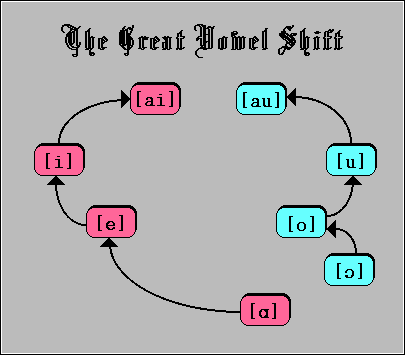There may be some truth in the 'vowel shift', but if u study texts with original spellings from 1350 to 1750, it is very difficult to find much evidence for it, because between 1430 and 1650 English spelling became increasingly varied and random. Between 1525, the publication of the first English New Testament, and 1611, the year of the King James Bible, most English words acquired several spellings. This can be seen in the writings of Sir Thomas Moore and the highly educated Elizabeth I.
What the study of old texts reveals very clearly is that English spelling was repeatedly deliberately messed up, leaving the relationships between sounds letters increasingly random. The first time was over 1000 years ago, when some monastic scribes disliked having to write sequences of short strokes next to each, as u would get with a sensible spelling of 'munth'. So they substituted o for u next to n and n (month, front) and also next to v which back then spelt v and u (hence the name double u for w): love, glove, wonder.
Around 1430 Chancery Clerks were suddenly obliged to switch from French to English. They took their anger about this out on English spelling. They severely undermined Chaucer's consistent use of e and e-e (bed, bred, erly; seke, speke, reson), with irregularities which persist to this day. They not only added ea to the English alphabet but used it for several sounds as well (treat, great, threat).
Early printers messed up English spelling a bit more, by adding extra letters to earn more money, as they were paid by the line. Many of them also spoke no English and made all kind of random changes (e.g. sadnes to sadnesse, frend - friend, bild - build).
The final blow was dealt by Samuel Johnson who wanted to force English into a Latin mould. He was most responsible for undermining the English use of doubled consonants for marking short vowels (rabbit, merry, poppy) by exempting many Latinate words from the system (habit, very, copy) or using doubled letters to show defunct Latin prefixes (e.g. adplicare - apply).
For a fuller explanation of the above see
http://englishspellingproblems.blogspot.co.uk/2012/12/history-of-english-spelling.html

